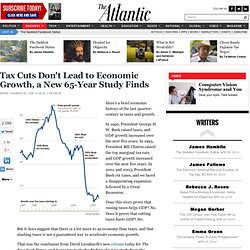

Beyond the Laffer Curve — the case for confiscatory taxation. Daily chart: Thirsty work. Tax Cuts Don't Lead to Economic Growth, a New 65-Year Study Finds - Derek Thompson. Here's a brief economic history of the last quarter-century in taxes and growth.

In 1990, President George H. W. Bush raised taxes, and GDP growth increased over the next five years. In 1993, President Bill Clinton raised the top marginal tax rate, and GDP growth increased over the next five years. In 2001 and 2003, President Bush cut taxes, and we faced a disappointing expansion followed by a Great Recession. Does this story prove that raising taxes helps GDP? But it does suggest that there is a lot more to an economy than taxes, and that slashing taxes is not a guaranteed way to accelerate economic growth.
Des économistes lancent un manifeste contre la rigueur. Simon Johnson: 'We Are Looking Straight Into The Face Of A Great Depression' By Mark Harrison, CFA In the opening session of the fourth annual CFA Institute European Investment Conference today in Paris, MIT Sloan School of Management professor Simon Johnson didn’t equivocate on the perils of the current global economic environment.

“We have built a dangerous financial system in the United States and Europe,” said the former chief economist at the International Monetary Fund. “We must step back and reform the system.” Professor Johnson cited alarming parallels with October 1931, when “people thought the worst was behind them, but the smart people were wrong and instead the crisis just broadened.” Johnson began his talk by pointing to the recent failure of MF Global (MF) as good news because it “barely caused a ripple in markets, despite its $40 billion balance sheet.” Johnson says these large institutions get a 50 basis point benefit on their debt costs from the implicit U.S. government guarantee.
The Wrong Worries. The Road to Economic Crisis Is Paved With Euros. What does this have to do with the case for or against the euro?

Well, when the single European currency was first proposed, an obvious question was whether it would work as well as the dollar does here in America. And the answer, clearly, was no — for exactly the reasons the Ireland-Nevada comparison illustrates. Europe isn’t fiscally integrated: German taxpayers don’t automatically pick up part of the tab for Greek pensions or Irish bank bailouts. And while Europeans have the legal right to move freely in search of jobs, in practice imperfect cultural integration — above all, the lack of a common language — makes workers less geographically mobile than their American counterparts. And now you see why many American (and some British) economists have always been skeptical about the euro project.
These observations aren’t new: everything I’ve just said was well known by 1992, when the Maastricht Treaty set the euro project in motion. The euro, then, would proceed. Innovation Kills Monopolies Faster Than Governments Can: Tech News and Analysis. Do government antitrust measures help break up monopolies and increase innovation?

Not according to new research from the Technology Policy Institute, which looked at the high-profile antitrust investigations of IBM, AT&T and Microsoft. The research found that in each case, the innovation that changed the industry did not come as a result of government intervention, but from sources that regulators could not possibly have predicted. This is likely to be music to the ears of Google, which has come under increasing pressure from both regulators and critics as it expands beyond search into other areas — including a controversial acquisition offer for travel industry player ITA that is currently under review.
The research (the full version of which is available as a PDF here) was done by Robert Crandall — a senior fellow in economics at the Brookings Institute — and Charles Jackson, a computer science professor at George Washington University. IBM. La polémique Goldman Sachs. ECONOMY. The Future of Money. FMI ou pas FMI ? The economics of Open Source. 9 Things The Rich Don't Want You To Know About Taxes. For three decades we have conducted a massive economic experiment, testing a theory known as supply-side economics.

The theory goes like this: Lower tax rates will encourage more investment, which in turn will mean more jobs and greater prosperity—so much so that tax revenues will go up, despite lower rates. The late Milton Friedman, the libertarian economist who wanted to shut down public parks because he considered them socialism, promoted this strategy. Ronald Reagan embraced Friedman’s ideas and made them into policy when he was elected president in 1980. For the past decade, we have doubled down on this theory of supply-side economics with the tax cuts sponsored by President George W.
Bush in 2001 and 2003, which President Obama has agreed to continue for two years. You would think that whether this grand experiment worked would be settled after three decades. Tax policy is something the framers left to politics. 1. Credits: WW CHART — SOURCE: MEDICARE TAX DATABASE; CENSUS 2. 3. 4.